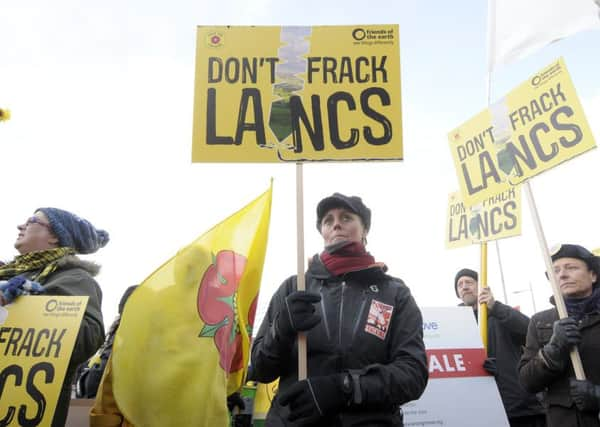Readers' letters - March 7


We are writing in response to your article, Farmers lead protests against ‘dirty’ fracking, published last Friday (LEP February 26).
As local farmers, we believe that the fracking industry can co-exist with agriculture – just as we do now with many other industries in the Fylde and West Lancashire, including nuclear fuel manufacturing, aerospace and chemicals manufacturing.
Advertisement
Hide AdAdvertisement
Hide AdIt would be quite wrong to allow the potential benefits of a new industry for the local area be denied through the actions of certain interest groups spreading fear and misinformation.
Often ignored in this debate are the economic opportunities on offer for the local farming community from a responsibly-developed fracking industry.
These include the diversification of farming incomes such as those on offer from the renewable energy sector such as solar and anaerobic digestion.
Unlike some energy technologies, shale gas requires a relatively small amount of land for production on a temporary basis – meaning there is more land available for our core business of farming.
Advertisement
Hide AdAdvertisement
Hide AdWe should also consider the opportunity for domestically sourced shale gas to help stabilise UK fertilizer price – an important overhead for many farmers.
During this sensitive time, we’d urge people to act responsibly by not talking-up non-existent threats such as blight on local land from fracking.
Such unsubstantiated scaremongering is dangerous for local farming and serves no-one’s interests save for external pressure groups.
Jack Wright, farmer
Tim Laycock, farmer
Sir Michael was right over veil
Your report in the Post (January 29) regarding Ofsted and the wearing of the veil by teachers and pupils was a bit one-sided.
Advertisement
Hide AdAdvertisement
Hide AdFrance has grasped the nettle and banned the veil in public, and quite rightly so.
Cameron has just stated his opposition to it, but it’s all hot air again as usual.
He hasn’t the bottle to do anything about it.
It’s wrong that wearers of such can go into banks, stores, and many other places, and drive vehicles with all the possible implications it could cause.
Some have even tried to go to court in it.
The Ofsted chief, Sir Michael Wilshaw, is entirely right in directing his inspectors to downgrade schools when they persist in allowing teachers and pupils to wear it.
Advertisement
Hide AdAdvertisement
Hide AdEither way, one or the other can only see eyes – that’s not normal!
Saying that he should resign or be sacked is just ridiculous.
There is nothing fascist or racist about Sir Michael’s directive. It’s just good common sense.
A while back we had the big problem of Trojan Horse.
There were schools in Birmingham where radical parents and school governors gained power regarding their schools. Not only Birmingham, but in other cities. It’s all gone quiet but it’s still there and the Government hasn’t got a clue how to sort it out.
D. R. Rimmer, Grange over Sands
Private firms need profits
Advertisement
Hide AdAdvertisement
Hide AdWhat goes around, comes around, your correspondent Coun Mark Yates seems to blame the deregulation of bus transport by Margaret Thatcher for the demise of local bus services (LEP Letters March 2).
If this policy is so bad/wrong, why did the Labour Government, which was in power for 13 years, not reverse it?
It is unfortunately a fact of life that private companies have to make a profit to survive.
Frank Maher via e-mail
More workers with pensions
The North West Regional Pensioners Association (NWRPA) has welcomed new figures from the Office for National Statistics which show growing numbers of workers with pensions schemes as a result of automatic enrolment.
Advertisement
Hide AdAdvertisement
Hide AdThe data shows that workplace pension scheme membership has increased from 59 per cent in 2014 to 64 per cent in 2015.
Membership increased most for the group aged between 22 to 29 years – up seven per cent to 61 per cent.
However, the proportion of private sector workers who receive a contribution from their employer below four per cent of their earnings has increased from 43 per cent in 2014 to 50
per cent in 2015. Automatic enrolment is transforming pensions by boosting the number of workers who are saving for retirement.
Advertisement
Hide AdAdvertisement
Hide AdIt’s especially good news to see a big increase in young workers with a pension.
But getting more workers enrolled on a pension scheme is not enough alone.
We need to build a consensus on how higher pension contributions can be achieved, or many people will find they have too little income to get by in retirement.
Derek Barton NWRPA secretary
My dad was in Quetta too
I read Stuart Clewlow’s article about John Ratcliffe and the Quetta earthquake with some interest (Retro, February 12).
Advertisement
Hide AdAdvertisement
Hide AdMy father, who died in 1987, was at the time stationed with the RAF in Quetta.
He was an air gunner (Cpl) and flew in Wapiti aircraft.
His air force number started with 516, very similar to John Ratcliffe.
My dad served for five years in India and, when he died, he left me a number of old photographs of the area, including the mess the earthquake had caused.
G Richardson, Hoghton
Referendum or neverendum?
Referendum?
It’s becoming more like a neverendum to a lot of us, so June 23 cannot come soon enough!
Mr R Urquhart, address supplied